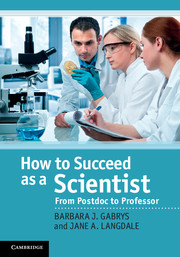Book contents
- Frontmatter
- Contents
- Preface
- Acknowledgements
- Part I Becoming an independent researcher
- 1 Managing your time
- 2 Giving a good research talk
- 3 Writing a quality research paper
- 4 Handling scientific criticism
- 5 Writing grant applications
- 6 Tools for managing research projects
- 7 Is there life beyond academia?
- 8 Applying for a job in academia
- 9 Applying for an independent research fellowship
- Part II Thriving in your new job
- Part III Managing your career
- Index
1 - Managing your time
from Part I - Becoming an independent researcher
Published online by Cambridge University Press: 05 November 2011
- Frontmatter
- Contents
- Preface
- Acknowledgements
- Part I Becoming an independent researcher
- 1 Managing your time
- 2 Giving a good research talk
- 3 Writing a quality research paper
- 4 Handling scientific criticism
- 5 Writing grant applications
- 6 Tools for managing research projects
- 7 Is there life beyond academia?
- 8 Applying for a job in academia
- 9 Applying for an independent research fellowship
- Part II Thriving in your new job
- Part III Managing your career
- Index
Summary
The focus of your life as a postdoc is research but as a university academic you will increasingly have many more duties and responsibilities. Research becomes just one part of your life – teaching, administration, family life and interests outside of work all have to be fitted into the same amount of time. Using a ‘principle-based’ framework established by Stephen Covey, adapted here for life as a scientist in a university, this chapter aims to help you balance conflicting demands on your time.
The theory
If you are reading these words now, the chances are that you have become aware of the need to manage your time or have decided that your current system does not quite deliver. Time management theory has evolved over the years through first, second, third and now fourth generations – each generation seemingly improving on those that came before. In a nutshell, the first generation approach aims to bring order into chaos through organisation, and is epitomised by the use of ‘to do’ tools. In contrast, the second generation centres on the protection of personal time in order to be effective and is about planning and preparation, whereas the third generation focuses on prioritising goals. Perhaps not surprisingly, the fourth generation encompasses all of this and aims to harmonise personal and professional aims. Objectives are set through deep questioning and reflection, and are realised through the pragmatic use of time management tools such as weekly scheduling. Among the sources of fourth generation advice on how to cope with the increasing demands of work and the hectic pace of life are the books authored and co-authored by Stephen Covey. Here, we refer to and make use of his ‘principle-based’ framework (Covey et al., 1994). According to his philosophy, short- and long-term goals can be achieved by developing independence and interdependence, respectively. Crucially, both are based on sound principles – life-long personal development and successful delegation where appropriate.
Habits
Covey lays the foundations for his theories in his book entitled The 7 Habits of Highly Effective People (Covey, 2004). Here, he describes the attributes and actions of effective, successful people. His definition of habits is an unusual one: a habit is an intersection of knowledge, skill and desire. In this framework, knowledge is what and why to do; skill is how to do; and desire is the motivation, or the want to do (Covey, 2004). Importantly, while you can teach skills and acquire knowledge, you cannot teach desire – you either have it or have to discover that you have it.
- Type
- Chapter
- Information
- How to Succeed as a ScientistFrom Postdoc to Professor, pp. 3 - 17Publisher: Cambridge University PressPrint publication year: 2011



